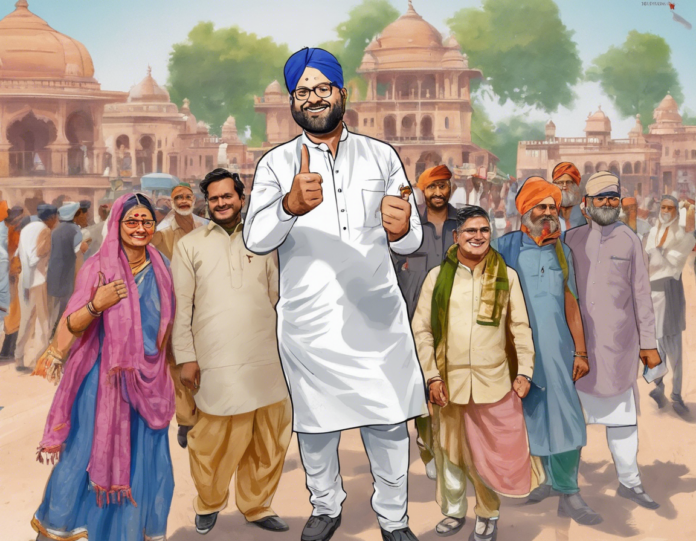The Rajasthan Assembly Election 2023 has been a significant event in the Indian political landscape, as it has the potential to influence the country’s political dynamics. With both the ruling and opposition parties making various claims and counterclaims about their prospects, it is essential to dissect the election outcome comprehensively.
Current Political Scenario in Rajasthan:
Rajasthan, historically known for its shifting political allegiances, witnessed a change in government during the 2018 elections when the Congress managed to dethrone the incumbent BJP. The Congress, under the leadership of Ashok Gehlot, formed the government with a close majority. However, this term was not devoid of challenges, including internal rifts within the party and tussles with the central leadership. On the other hand, the BJP, led by Vasundhara Raje, has been trying to regain its lost ground in the state.
Factors Influencing the Election Outcome:
-
Anti-Incumbency Factor: One of the primary factors that could sway the election results is anti-incumbency. The Congress government has faced criticism on various fronts, including governance issues, law and order situation, and economic policies. This dissatisfaction among the electorate might work in favor of the opposition party.
-
Leadership and Candidate Selection: The leadership prowess of both parties, Congress and BJP, and the choice of candidates in various constituencies play a crucial role in shaping voter perceptions. The charisma and popularity of the chief ministerial candidates often have a significant impact on electoral outcomes.
-
Local Issues and Development: The region-specific problems, developmental initiatives, and welfare schemes implemented by the ruling government can significantly influence the voting pattern. Issues like water scarcity, infrastructure development, employment generation, and healthcare remain crucial in the electoral discourse.
-
Alliance Dynamics: The alliances formed by political parties with regional players and the presence of influential independent candidates can alter the electoral equations. Understanding the dynamics of pre-poll and post-poll alliances is essential in predicting the election results accurately.
Key Contenders and Their Strategies:
-
Congress: The Congress party, under the leadership of Ashok Gehlot, has been striving to retain power in Rajasthan. Gehlot’s experience in state politics and administrative acumen remain vital assets for the party. The Congress is focusing on highlighting its developmental initiatives and welfare schemes to woo the electorate.
-
BJP: The BJP, with Vasundhara Raje at the helm, is leaving no stone unturned to reclaim power in the state. Raje’s connect with the grassroots level workers and her previous stint as Chief Minister are being projected as strengths by the party. The BJP is also banking on issues like national security, Hindutva ideology, and economic development.
-
Regional Parties and Independents: Apart from the two major players, regional parties like the Rashtriya Loktantrik Party (RLP) and independents hold the key to several constituencies. Their role in forming alliances and consolidating votes in favor of a particular party can sway the election results significantly.
Analysis of Opinion Polls and Exit Polls:
Opinion polls and exit polls conducted by various agencies play a significant role in gauging the public sentiment and predicting the election outcome. These polls, based on sampling methodologies and statistical analysis, provide a snapshot of which way the wind is blowing. It is imperative to analyze these polls along with ground realities to make an informed assessment.
Potential Scenarios and Coalition Possibilities:
-
Congress Retains Power: If the Congress manages to overcome the anti-incumbency factor and secure a majority on its own, it will continue to govern the state. In this scenario, Ashok Gehlot is likely to retain the Chief Minister’s chair.
-
BJP Comes to Power: A resurgence of the BJP in Rajasthan would lead to a change in government, with Vasundhara Raje possibly taking charge as the Chief Minister again. This scenario hinges on the BJP’s ability to capitalize on voter discontent and consolidate its traditional vote bank.
-
Hung Assembly and Alliance Formation: In the case of a hung assembly, where neither party secures a clear majority, the role of regional parties and independents becomes crucial. Both Congress and BJP would then be compelled to form alliances to stake claim to power.
Key Takeaways and Conclusion:
The Rajasthan Assembly Election 2023 is not just a state-level political event but a reflection of broader national political trends. The outcome of this election will impact the power dynamics in the state and potentially influence the narrative for the upcoming general elections. It is essential for both parties to navigate the electoral landscape diligently and address voters’ concerns effectively to emerge victorious.
FAQs:
Q1: When is the Rajasthan Assembly Election 2023 scheduled to take place?
A1: The exact date for the Rajasthan Assembly Election 2023 is yet to be announced, but it is expected to be held in late 2023.
Q2: Who are the key Chief Ministerial candidates for the Congress and BJP in Rajasthan?
A2: Ashok Gehlot leads the Congress, while Vasundhara Raje represents the BJP as the key Chief Ministerial candidates.
Q3: What are the major issues dominating the electoral discourse in Rajasthan?
A3: Key issues include governance, law and order, economic policies, water scarcity, infrastructure development, and employment generation.
Q4: Which parties are expected to play a significant role in potential alliance formations in Rajasthan?
A4: Regional parties like the Rashtriya Loktantrik Party (RLP) and influential independents are likely to influence alliance dynamics.
Q5: How do opinion polls and exit polls influence voter sentiment in elections?
A5: Opinion polls and exit polls provide insights into public sentiment, influencing voter perceptions and predicting electoral outcomes.












